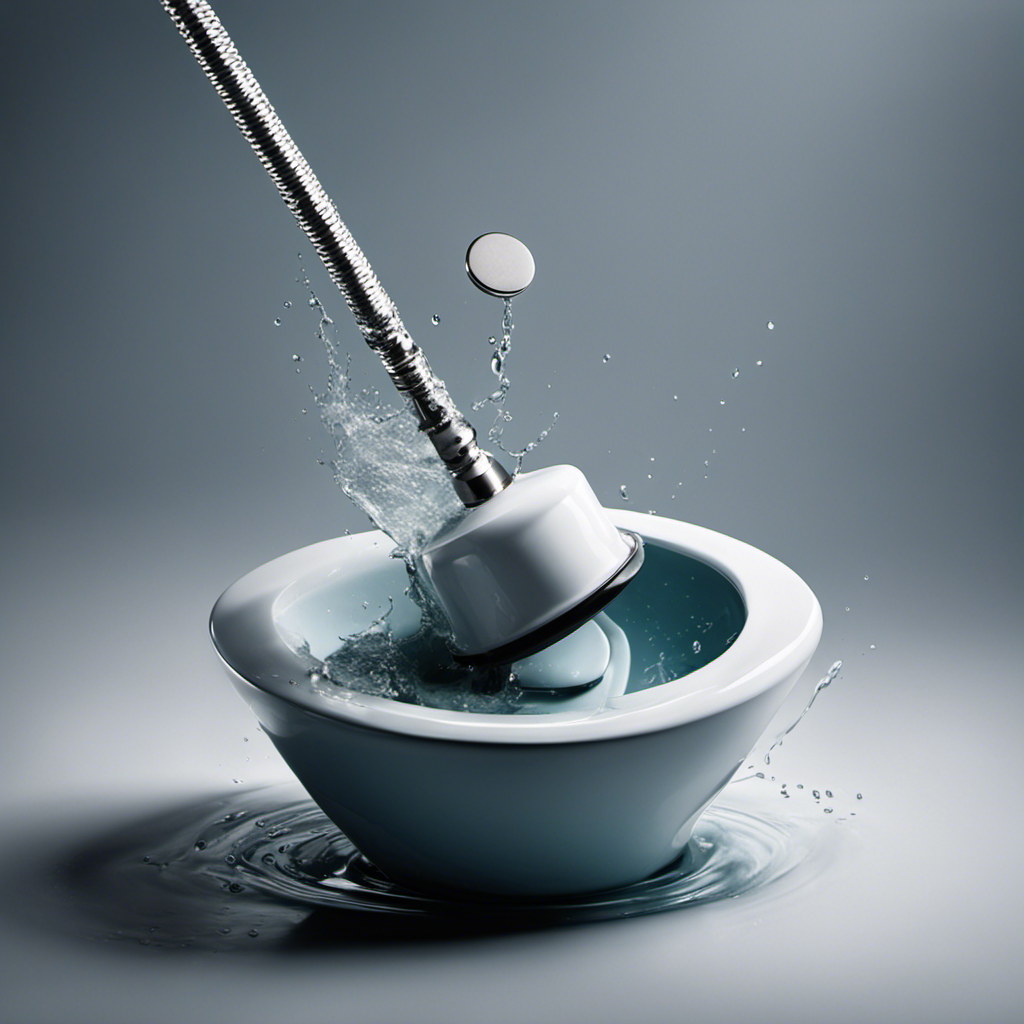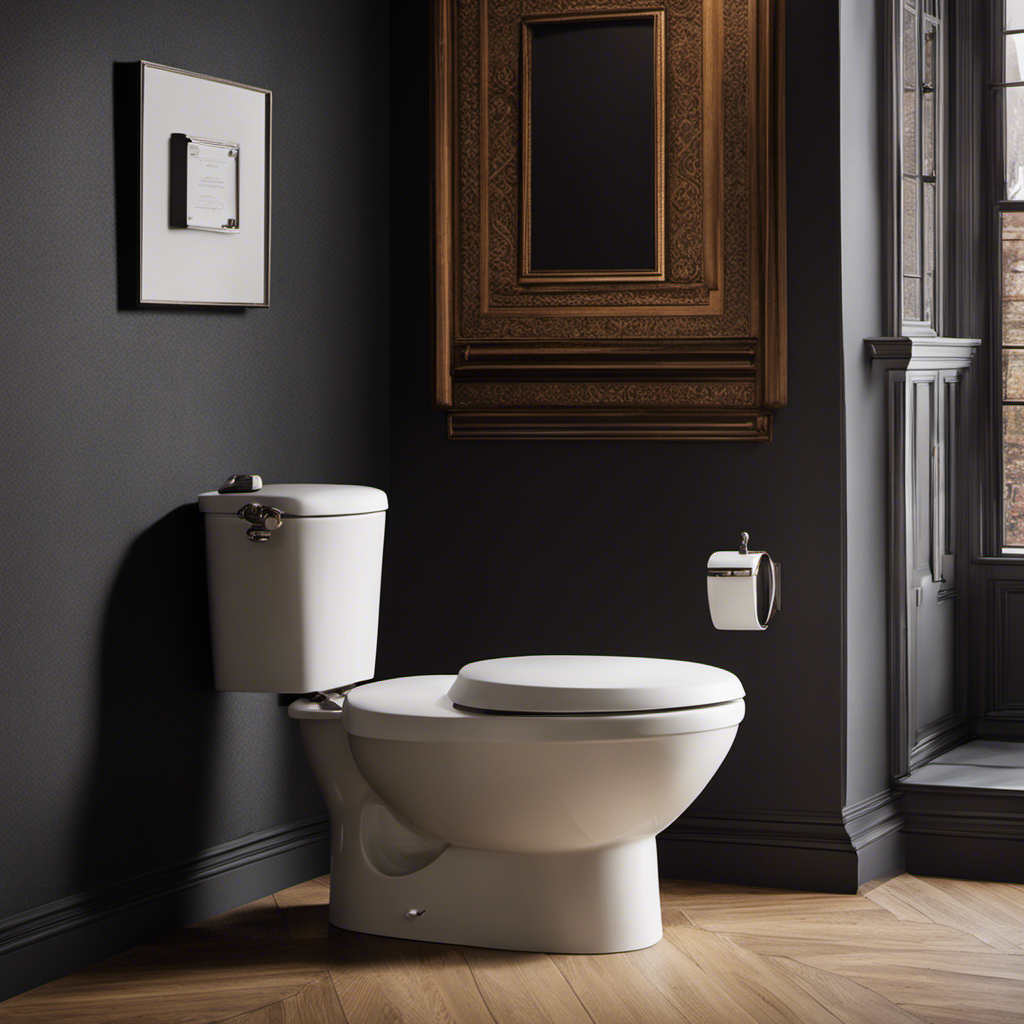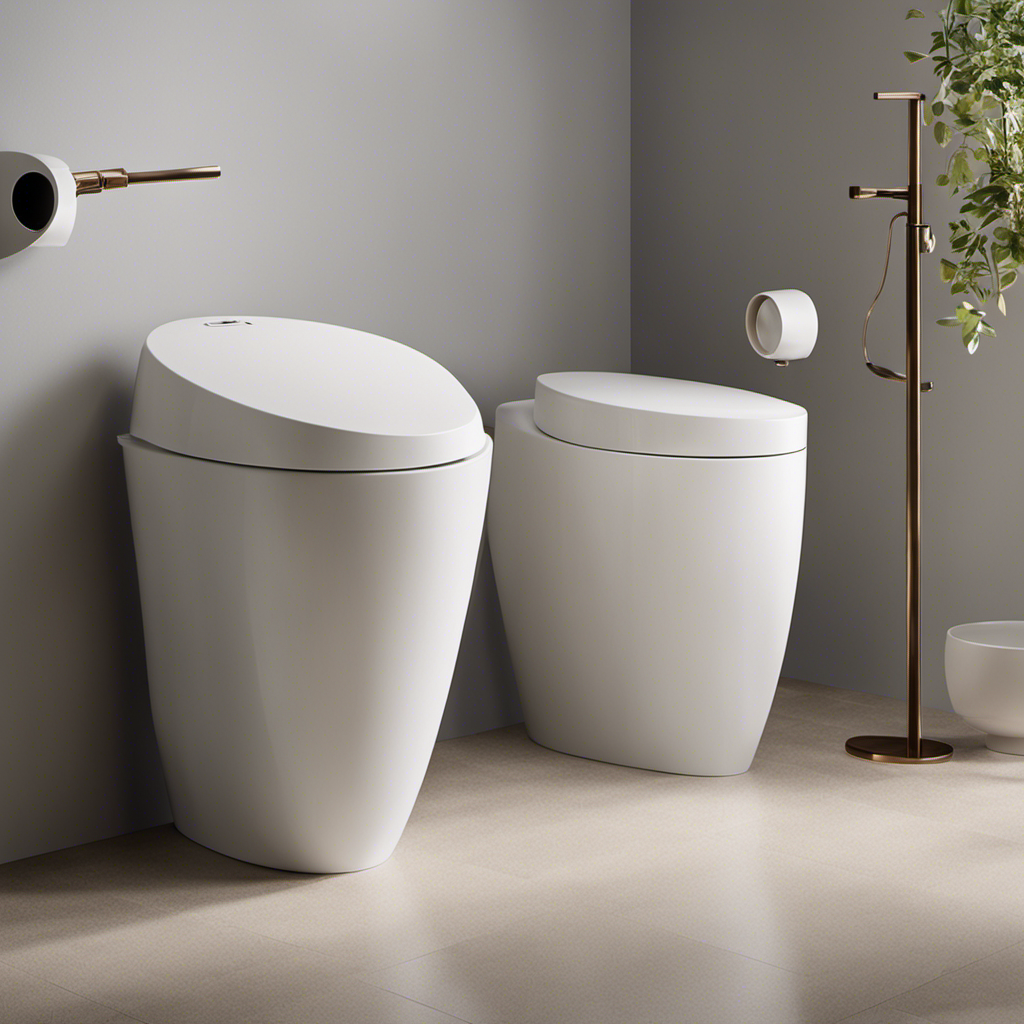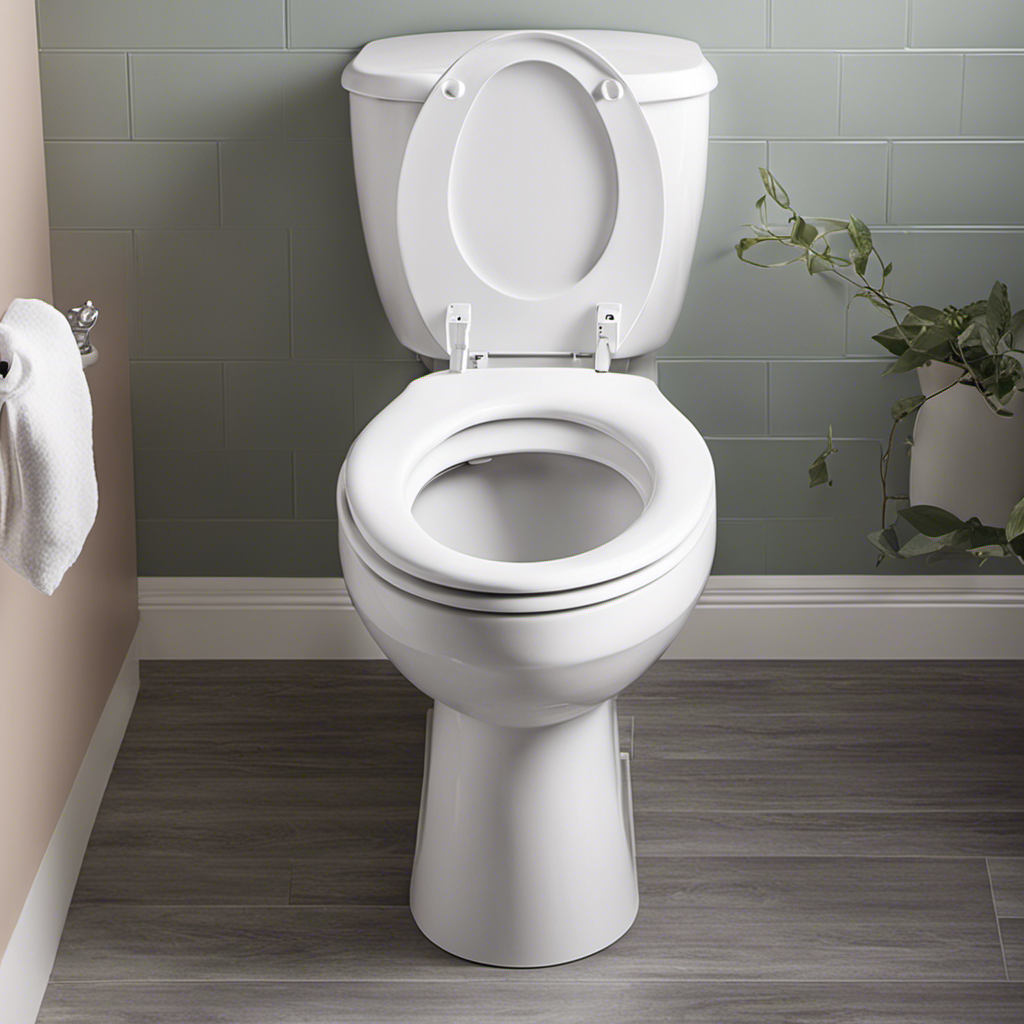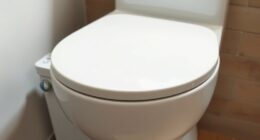Hey there! Ever had that dreaded moment when your toilet gets clogged? Trust me, it’s not a pleasant experience.
But fear not, because in this article, I’m going to share with you the tried and true techniques for unclogging a toilet.
From the classic plunger to powerful toilet augers, and even natural DIY remedies like baking soda and vinegar, we’ve got you covered.
So, sit back, relax, and get ready to say goodbye to those stubborn toilet clogs.
Key Takeaways
- A plunger and toilet auger are classic tools for unclogging toilets. They can dislodge clogs and restore proper drainage.
- Baking soda and vinegar can be used as a natural DIY remedy for unclogging toilets. The chemical reaction between them creates bubbles that help dislodge the blockage.
- Hot water and dish soap can be combined to create an easy and effective method for unclogging toilets. The hot water dissolves the clog while the dish soap acts as a lubricant.
- Enzyme-based drain cleaners are non-toxic and environmentally friendly. They effectively break down organic matter and prevent future clogs.
Plunger: The Classic Tool for Toilet Clogs
You should grab a plunger to unclog your toilet. A toilet plunger is a classic tool that can effectively tackle most minor clogs. It consists of a rubber suction cup attached to a wooden or plastic handle.
To use it, simply place the suction cup over the drain hole in the toilet bowl and push down firmly, then pull up quickly to create a suction effect. This repeated motion helps to dislodge the clog and restore proper drainage.
It’s important to remember that prevention is key when it comes to toilet clogs. Avoid flushing excessive amounts of toilet paper or anything other than waste and toilet paper. Regular maintenance, such as using a plunger, can help prevent clogs from occurring in the first place.
However, for more stubborn blockages, a toilet auger may be necessary.
Toilet Auger: A Powerful Solution for Stubborn Blockages
To tackle stubborn blockages in your toilet, try using a toilet auger for a powerful solution. A toilet auger, also known as a toilet snake, is a tool specifically designed to unclog toilets. Here are four reasons why a toilet auger can be an excellent choice:
-
Effective: A toilet auger can reach deep into the pipes and break up tough clogs, ensuring a thorough unclogging.
-
Versatile: It can handle various types of blockages, including those caused by toilet paper, hair, or foreign objects.
-
Cost-effective: By using a toilet auger yourself, you can save money on professional plumbing services.
-
Quick and easy: With a toilet auger, you can resolve the clog quickly and get your toilet back in working order without any hassle.
Baking Soda and Vinegar: A Natural DIY Remedy
For a natural DIY remedy to tackle stubborn blockages in your toilet, consider using baking soda and vinegar.
Baking soda, also known as sodium bicarbonate, has numerous benefits and is commonly used for cleaning and deodorizing. When combined with vinegar, a versatile household product with many uses, it creates a powerful solution for unclogging toilets.
The chemical reaction between baking soda and vinegar produces carbon dioxide, which creates bubbles and helps to dislodge the blockage.
To use this method, start by pouring a cup of baking soda into the toilet bowl. Then, slowly pour a cup of vinegar into the bowl as well. Let it sit for a few minutes, allowing the mixture to work its magic.
Hot Water and Dish Soap: Easy and Effective Unclogging Method
Hot water and dish soap can be combined to create an easy and effective method for unclogging stubborn blockages. This simple technique can save you time and money, without the need for harsh chemicals or expensive tools.
Here’s how it works:
-
Heat up the water: Boil a pot of water or use hot tap water. The higher the temperature, the better it will work to dissolve the clog.
-
Add dish soap: Pour a generous amount of dish soap into the toilet bowl. The soap will act as a lubricant and help break down the blockage.
-
Pour the hot water: Carefully pour the hot water into the toilet bowl. The hot water will help to soften and dislodge the clog, allowing it to flow through the pipes.
-
Repeat if necessary: If the clog doesn’t clear on the first try, repeat the process until the blockage is fully removed.
By using hot water and dish soap, you can effectively unclog your toilet without the need for harmful chemicals.
However, if this method doesn’t work, you may need to consider using enzyme-based drain cleaners to break down organic matter for a smooth flow.
Enzyme-Based Drain Cleaners: Breaking Down Organic Matter for Smooth Flow
If you’re dealing with stubborn organic blockages, enzyme-based drain cleaners can effectively break down the matter for a smoother flow. These cleaners contain natural enzymes that work by breaking down the organic matter into smaller particles, allowing it to easily flow through the pipes.
One of the key benefits of using enzyme-based drain cleaners over traditional chemical methods is that they are non-toxic and environmentally friendly. Unlike chemical drain cleaners, which can be harmful to both humans and the environment, enzyme-based cleaners use natural ingredients that are safe to use.
Additionally, enzyme-based cleaners can help prevent future clogs by breaking down organic matter that accumulates in the pipes over time. While they may take longer to work compared to chemical cleaners, the long-term benefits and safety make enzyme-based drain cleaners a preferred choice.
Frequently Asked Questions
Can I Use a Plunger on a Clogged Sink or Bathtub Drain?
Yes, you can use a plunger on a clogged sink or bathtub drain. It’s a common and effective method. However, if you’re looking for plunger alternatives or DIY drain unclogging methods, there are other options to consider.
How Long Does It Typically Take for Baking Soda and Vinegar to Unclog a Toilet?
I’ve tried various methods to unclog my toilet, but I’m curious about alternatives to using baking soda and vinegar. How can I effectively unclog a toilet without resorting to these common household ingredients?
Can I Use Hot Water and Dish Soap to Unclog a Toilet if I Don’t Have a Plunger?
If you don’t have a plunger, hot water and dish soap can be a helpful alternative to unclog a toilet. The hot water helps to break down the clog, while the dish soap acts as a lubricant.
Are Enzyme-Based Drain Cleaners Safe to Use in Septic Systems?
Enzyme-based drain cleaners are effective in unclogging septic systems. They contain enzymes that break down organic matter, helping to clear clogs and maintain a healthy septic system. It’s important to choose a cleaner specifically designed for septic systems to ensure safety and effectiveness.
What Should I Do if None of These Methods Work to Unclog My Toilet?
If none of the methods work to unclog my toilet, I would consider trying alternative methods like using a plunger or a plumbing snake. If those fail, it’s best to call professional plumbing services for assistance.
Conclusion
In conclusion, when faced with a stubborn toilet clog, there are several effective methods to choose from.
The classic plunger is a reliable tool that can often do the trick.
For more stubborn blockages, a toilet auger provides the power needed to clear the way.
If you prefer a natural DIY remedy, a combination of baking soda and vinegar can work wonders.
Alternatively, you can try the easy and effective method of using hot water and dish soap.
And for those dealing with organic matter, enzyme-based drain cleaners are the way to go.
With these options at your disposal, you’ll never be caught off guard by a clogged toilet again.
